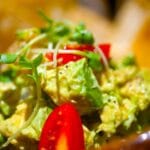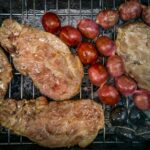So you want to learn to cook? Good for you. It is a skill, once obtained, that will reward you the rest of your life. One of the greatest feelings ever is to put together a special treat in the kitchen and watch the smiles from your family and friends when you place a dinner you cooked before them. These beginner cooking tips will help you do that.
Perhaps you are a college student or person living alone who is tired of fast food and TV dinners. Whatever your reason for wanting to learn to cook, these tips, some good recipes, and a little experience will get you started.

Our purpose is to provide the cooking tips and a few links to some good recipes. Then it’s up to you to put it to use and obtain the experience.
Index of all cooking tips articles HERE
About Recipes
Recipes are cooking instructions that should be used as guides for making a specific dish. Most recipes can be made better by using your own imagination to make the dish more closely match your individual taste. If you like spicy and the recipe calls for one teaspoon of crushed red peppers, go ahead and put in two if you want. Just remember to taste as you go.
However, be aware that some recipes should be followed precisely for safety. Specifically, any preserving or pickling recipes should be followed, as far as the proportions of vinegar, salt and water. Altering proportions in these recipes could lead to unhealthy food spoilage. That said, as far as that lasagna recipe you want to make, feel free to add more cheese if you like. Cooking Tips for Beginners encourages you to experiment and have fun in the kitchen.
What’s Not in the Recipe
The recipe can provide the ingredients but the cook has to provide the skill of putting it together. As you learn to cook be aware of the “look and feel” of food. For example, when making mashed potatoes, the amount of liquid added will determine if the final dish is thick, thin, smooth or soupy. Although the recipe may call for one cup of milk, you may need more or less than one cup. It depends on how you like your mashed potatoes. So how do you get the final result to be what you like? By taste, look and feel! You must learn to observe and feel the consistency of your food and always taste, taste,taste as you put your ingredients together and during cooking that yummy recipe.
Any recipe that calls for making a batter or dough can be altered dramatically by the consistency of the batter or dough. Cakes, biscuits, pancakes, waffles and breads, for example, all require preparing a batter or dough. With experience you will learn the look of the batter that results in what you like. You will then make the proper batter by the addition of liquid according to the “look and feel” of the batter.
Safety in the Kitchen
The kitchen is where more accidents happen than any other room in your house (possible second to the bathroom).
READ MORE…
Seasoning Tips
Salt is undoubtedly the world’s all time favorite seasoning. It was considered so valuable in some societies that it was used as money. Today we know that too much salt can lead to health problems in some people, but we still love our salt. As a beginner cook you should learn to use salt to enhance a bland tasting dish. Salt will liven up tasteless food. However, remember…
READ MORE…
Baking Tips
* Always pre-heat your oven to the temperature specified in the recipe.
* Use an oven thermometer to determine the accuracy of the temperature control on your oven. You will only have to do this once. If you set the oven for 400 degrees F. and find that the thermometer shows the oven is actually 415 degrees F., you will know in the future to set the control just slightly below the 400 degree setting when you want 400 degrees.
* When making biscuits, do not overwork the dough. Just two or three folds is all that is needed. Overworking the dough results in…
READ MORE…


